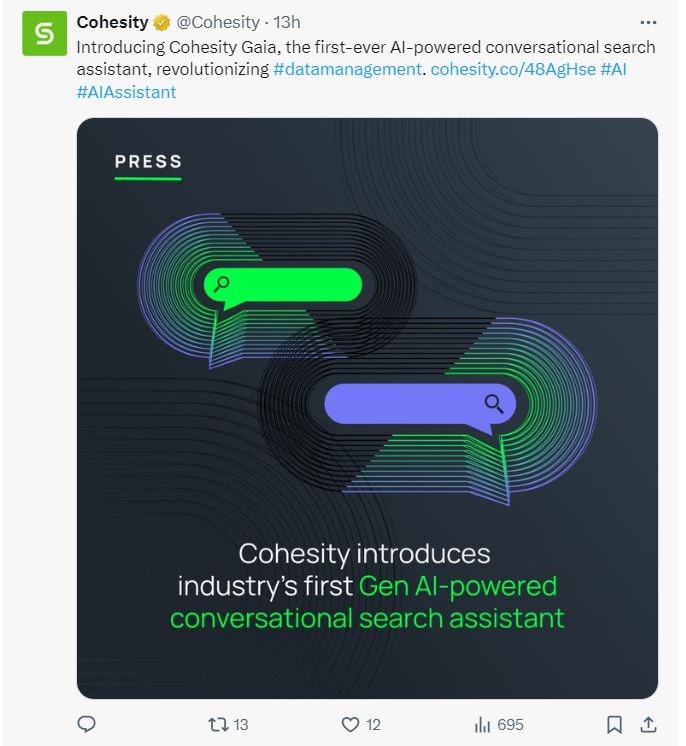
Cohesity Gaia is a conversational AI assistant that enables users to ask questions and receive answers by accessing and analyzing their vast pools of enterprise data. (Image generated by AI).
Retrieval augmented generative AI in backup and recovery
- AI plays a crucial role in enhancing data backup and recovery processes for businesses.
- Cohesity has unveiled the industry’s first AI-powered enterprise search assistant.
- Cohesity Gaia is a conversational AI assistant that enables users to ask questions and receive answers by accessing and analyzing their vast pools of enterprise data.
AI plays a crucial role in enhancing data backup and recovery processes for businesses. As the technology evolves, automating backup and recovery processes is a prerogative for most organizations today.
In fact, AI is capable of making backups more efficient. For example, newer backup technologies use AI and machine learning to automate the ongoing task of backing up critical data and software components. These intelligent tools can be trained by IT engineers to follow priorities and requirements for data security and recovery plans.
When it comes to incident response, AI can offer recommendations for actions an incident response team should consider taking. AI also analyzes large amounts of data faster and more objectively than humans, aiding quick decisions during critical minutes after an incident.
More importantly, AI in incident response is capable of automating recovery tasks, such as reinstalling or reconfiguring network servers. For data recovery, machine learning algorithms automate data classification and retrieval, making it easier to prioritize and recover essential business assets. These speed up recovery processes, minimizing downtime and ensuring business continuity. It ensures that data backups, incident response, and asset recovery work together efficiently.
Simply put, AI enhances data backup and recovery by automating tasks, improving incident response, and ensuring efficient recovery of both business and technology assets.

Introducing Cohesity Gaia, the first-ever AI-powered conversational search assistant.
An AI search assistant in backup and recovery
For businesses, having a backup solution that uses AI is essential in ensuring they are capable of ensuring business continuity. Given the rising number of ransomware cases, paying the ransom should not be seen as a solution.
Instead, businesses should invest in backup solutions that can give them instant recovery should they ever face any cybersecurity incidents. The data retrieval process in recovery should be also be seamless.
Given this need, Cohesity has unveiled the industry’s first AI-powered enterprise search assistant that brings retrieval augmented generation (RAG) AI and large language models (LLMs) to high-quality backup data within Cohesity environments. Cohesity Gaia is a conversational AI assistant that enables users to ask questions and receive answers by accessing and analyzing their vast pools of enterprise data.
The AI assistant relies on RAG. RAG is a natural language processing technique that combines the benefits of retrieval-based and generative-based approaches to improve the quality of text generation tasks, such as question-answering, summarization, and conversational AI. RAG models combine the strengths of LLMs with the ability to retrieve information from multiple sources. RAG enables LLMs to generate more knowledgeable, diverse, and relevant responses and offers a more efficient approach to fine-tuning these models.

AI in incident response is capable of automating recovery tasks, such as reinstalling or reconfiguring network servers. (Image generated by AI).
According to a media release by Cohesity, the AI search assistant is capable of transforming data into knowledge when coupled with the Cohesity Data Cloud. It can help accelerate the goals of an organization while keeping data secure and compliant. Cohesity has announced plans with the three largest public cloud providers to bring their LLM services to Cohesity Gaia.
The underlying architecture of Cohesity Data Cloud manages and secures data with a unique blend of performance, extensibility, and scale. Cohesity Gaia extends the value proposition of Cohesity Data Cloud even further:
- By building a RAG AI solution on Cohesity’s multi-cloud platform, Cohesity will be able to seamlessly provide RAG AI conversational search experiences across cloud and hybrid environments that will allow enterprises to gain deeper insights into their data and make informed decisions in the future, no matter where their stored data resides.
- Cohesity maintains a fully indexed backup of all files, across all workloads, and at all points in time. This robust capability supports the creation of AI-ready indexes for rapid conversational search and responses, providing enterprises with quick and accurate results. Initially, Cohesity will support Microsoft 365 and OneDrive data and will expand to more workloads over time.
- The unique architecture of Cohesity Gaia ensures that all indexed data is immediately available for reading without the need for backups to be reconstructed. This allows the Cohesity Data Cloud to function like a data lake, providing businesses with real-time access to their data for analysis and decision-making.
- The Cohesity Data Cloud employs granular, role-based access controls and zero-trust security principles, ensuring that only authorized users and models have access to the necessary data. This not only protects sensitive information but also helps enterprises maintain compliance with various regulatory requirements.

Cohesity Gaia offers a comprehensive solution that caters to the unique requirements of enterprises. (Image generated by AI).
Addressing LLM challenges in backup and recovery
“The narrative surrounding the ease of deploying advanced machine learning systems like RAG can be misleading. While it’s true that modern frameworks and pre-built models have simplified the process to an extent, they often gloss over the complexities that arise when scaling to enterprise levels,” explained Gregg Staton, office of the CTO – data & AI, Cohesity in a blog post.
Enterprises looking to utilize LLMs often face several challenges. Developers must first create more copies of data, thereby increasing the threat footprint for an attack. What’s more, the data may be incomplete or dated. Finally, this approach requires additional time and resources and puts an added burden on the system’s performance. Cohesity Gaia overcomes these challenges by integrating AI capabilities within a customer’s backup environment.
Cohesity Gaia helps organizations make better, faster decisions across a myriad of use cases, such as:
- To assess an organization’s level of cyber-resilience.
- To quickly perform financial and compliance audit checks.
- To answer complex legal questions.
- To serve as a knowledge base to train new employees.
“Enterprises are excited to harness the power of generative AI but have faced several challenges gaining insights into secondary data, including backup, archived and vaulted data – because every approach requires re-hydrating the data, and painfully waiting weeks for the data to be available for analytics and insights. Cohesity Gaia dramatically simplifies this process with our patent-pending approach using Retrieval Augmented Generation,” said Sanjay Poonen, CEO and president of Cohesity.
“With Cohesity Gaia, for the first time in our industry, companies will be able to leverage generative AI to query their data in a virtually seamless way. Our approach delivers rapid, insightful results without the drawbacks of more manual and risky approaches. In short, it turns data into knowledge within seconds and minutes,” added Poonen.
At the core of Cohesity AI technologies is Cohesity Turing, a patent-pending collection of AI capabilities and technologies integrated into Cohesity’s multi-cloud data management and security platform, that provide operational and data insights. The foundation of these AI innovations is the concept of “responsible AI,” with capabilities and frameworks that enable customers to introduce AI to backup data securely and safely at scale. All
Cohesity Turing solutions adhere to these responsible AI principles:
- Transparency: Protect access to the data with role-based access controls. Promote transparency and accountability around access and policies.
- Governance: Ensure the security and privacy of data used by AI models and the workforce—so the right data is exposed only to the right people (and models) with the right privileges.
- Access: Integrate indexed and searchable data securely and easily while ensuring data is immutable and resilient.
“It is important to understand that Cohesity Gaia does not retrieve data like a search engine; it answers questions,” added Statton.
”For example, if you notice a rise in costs in a region, typically, you would search for dozens of invoices, review and compare them, and see if you can discover the reason for the cost increases. It could take hours, days, or weeks to resolve. With Cohesity Gaia, you simply ask, ‘Why have costs increased in the region?’ and Cohesity Gaia will pull the relevant information from your stored data, analyze it, and return an answer to your question. It’s that simple.”
READ MORE
- Data Strategies That Dictate Legacy Overhaul Methods for Established Banks
- Securing Data: A Guide to Navigating Australian Privacy Regulations
- Ethical Threads: Transforming Fashion with Trust and Transparency
- Top 5 Drivers Shaping IT Budgets This Financial Year
- Beyond Connectivity: How Wireless Site Surveys Enhance Tomorrow’s Business Network






